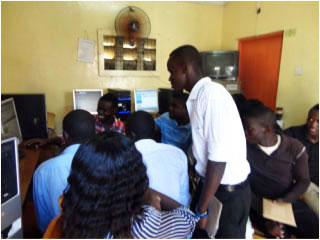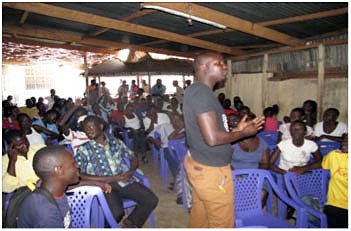|
WiRED CHE Center Continues to Draw Kenyans in Need
BY ALLISON KOZICHAROW, EDITED BY BERNICE BORN
W

Medical students access CHE modules
iRED International's Community Health Education (CHE) Center in Kisumu, western Kenya, attracts both medical students and members of underserved communities to programs that improve people’s health outcomes.
Lillian Dajoh, WiRED’s coordinator in the Kisumu CHE center says, “The outreach targets medical personnel, primary care givers and children in and out of school. To some clients, it is their only gateway to health information.”
Using a laptop-connected projector, the CHE Center staff can showcase health modules from WiRED’s e-library to as many people as can fit in the meeting rooms.
—Lillian Dajoh, CHE Coordinator
Recently a group of 73 students from Kenyatta University, Jaramogi Oginga Odinga University and Kenya Medical Training College arrived at the CHE Center to access WiRED’s health information modules. For more than seven hours the students focused on topics such as urinary tract infection, blood disorders, child growth and development, infectious diseases, maternal child health and cancer. They found the polio module of particular interest because they were researching infectious disease for their end term examinations. Three-quarters of the students returned later for more information.
 Following an outbreak of polio in different parts of Kenya, another group of 12 medical students from Kenya Medical Training College traveled to the CHE center. Since immunization campaigns for children began, these students had been deputized by the Kisumu District Hospital to support the medical professionals in giving vaccinations. Several of them told WiRED staff members that studying the CHE modules on polio proved invaluable to their assignment.
The Center’s programs provide medical school and college students with hands-on experience and fruitful discussion. Using projectors to support group sessions has increased the number of people accessing health information in Kisumu.
Through the CHE program, community parents learn to recognize signs and symptoms of common illnesses to help them know when to seek professional medical attention for themselves and their children. They also learn prevention to head off serious illnesses, such as cholera and rheumatic heart disease.
The CHE project has increased access to reproductive health information among children and youth, with the expectation that correct information will help reduce teenage pregnancies in school. Many students have no other source of accurate information about reproductive health.

CHE staff member facilitates a discussion
with local youth on HIV/AIDS
After accessing heath information on sexually transmitted diseases (STDs), three male bicycle riders (operating bicycle taxis called boda-bodas) approached CHE support staff for a discussion. The bicyclists identified several symptoms that they experienced in the past month, and the CHE staff referred them to a local clinic, where they were treated. These three riders then spread the word, and 40 additional riders came to the Center for information. Among the 40, five were treated for STDS and nine were tested for HIV.
WiRED’s Center in Kisumu opened its doors 12 years ago and has been recently dedicated as the Faye F. and Sheldon S. Cohen Center. (See earlier story.)
In serving more people than ever through its CHE Centers and programs, WiRED continues to fight against health knowledge inequality among populations left behind.
^ Back to the Top
|

